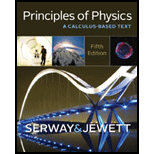
Concept explainers
The amount of the energy required to change ice cube from ice to steam.
Answer to Problem 13P
The amount of the energy required to change ice cube from ice to steam is
Explanation of Solution
Given info: The mass of the ice cube is
The specific heat of ice is
The formula calculate heat required to change the temperature from
Here,
Substitute
Thus, the heat required to change the temperature from
The formula to calculate heat required by the ice to convert into water at constant temperature is,
Here,
Substitute
Thus, the heat required by the ice to convert into water is
The formula calculate heat required to change the temperature from
Here,
Substitute
Thus, the heat required to change the temperature from
The formula to calculate heat required by the water to convert into steam at constant temperature is,
Here,
Substitute
Thus, the heat required by the water to convert into steam is
The formula calculate heat required to change the temperature from
Here,
Substitute
Thus, the heat required to change the temperature from
The total heat needed to convert change ice cube from ice to steam is,
Substitute
Conclusion:
Therefore, the amount of the energy is required to change ice cube from ice to steam is
Want to see more full solutions like this?
Chapter 17 Solutions
Principles of Physics: A Calculus-Based Text
- One way to cool a gas is to let it expand. When a certain gas under a pressure of 5.00 106 Ha at 25.0C is allowed to expand to 3.00 times its original volume, its final pressure is 1.07 106 Pa. (a) What is the initial temperature of the gas in Kelvin? (b) What is the final temperature of the system? (See Section 10.4.)arrow_forwardIf the average kinetic energy of the molecules in an ideal gas initially at 20C doubles, what is the final temperature of the gas? (5.6) (a) 10C (b) 40C (c) 313C (d) 586Carrow_forwardA certain ideal gas has a molar specific heat of Cv = 72R. A 2.00-mol sample of the gas always starts at pressure 1.00 105 Pa and temperature 300 K. For each of the following processes, determine (a) the final pressure, (b) the final volume, (c) the final temperature, (d) the change in internal energy of the gas, (e) the energy added to the gas by heat, and (f) the work done on the gas. (i) The gas is heated at constant pressure to 400 K. (ii) The gas is heated at constant volume to 400 K. (iii) The gas is compressed at constant temperature to 1.20 105 Pa. (iv) The gas is compressed adiabatically to 1.20 105 Pa.arrow_forward
- A hollow aluminum cylinder 20.0 cm deep has an internal capacity of 2.000 L at 20.0C. It is completely filled with turpentine at 20.0C. The turpentine and the aluminum cylinder are then slowly warmed together to 80.0C. (a) How much turpentine overflows? (b) What is the volume of the turpentine remaining in the cylinder at 80.0C? (c) If the combination with this amount of turpentine is then cooled back to 20.0C, how far below the cylinders rim does the turpentines surface recede?arrow_forwardAt 25.0 m below the surface of the sea, where the temperature is 5.00C, a diver exhales an air bubble having a volume of 1.00 cm3. If the surface temperature of the sea is 20.0C, what is the volume of the bubble just before it breaks the surface?arrow_forwardA hollow aluminum cylinder 20.0 cm deep has an internal capacity of 2.000 L at 20.0C. It is completely filled with turpentine at 20.0C. The turpentine and the aluminum cylinder are then slowly warmed together to 80.0C. (a) How much turpentine overflows? (b) What is the volume of the turpentine remaining in the cylinder at 80.0C? (c) If the combination with this amount of turpentine is then cooled back to 20.0C, how far below the cylinders rim does the turpentines surface recede?arrow_forward
- A 50.0 g copper calorimeter contains 290 g of water at 20.0°C. How much steam must be condensed into the water if the final temperature of the system is to reach 40.0°C?arrow_forwardA jet of steam at 100°C is applied to a 2.00 kg block of ice at 0°C. How many grams of steam would be required to completely melt the ice assuming a complete transfer of thermal energy? nA d bloow olle boutaig erd 15000 lo yolla an ai e W lobin bna 1900 lo yolla ns e losbinom 4arrow_forwardThe world's deepest gold mine, which is located in South Africa, is over 5.3 km deep. Every day, the mine transfers enough energy by heat to the mine's cooling systems to melt 364320 kg of ice at 0.0 degrees Celsius. If the energy output from the mine is increased by 3.3 percent, to what final temperature will the 364320 kg of ice-cold water be heated? Latent Heat of fusion of Ice = 3.33 × 105 J/kg Specific heat capacity of Water = 4186J/(kg.°C)arrow_forward
 An Introduction to Physical SciencePhysicsISBN:9781305079137Author:James Shipman, Jerry D. Wilson, Charles A. Higgins, Omar TorresPublisher:Cengage Learning
An Introduction to Physical SciencePhysicsISBN:9781305079137Author:James Shipman, Jerry D. Wilson, Charles A. Higgins, Omar TorresPublisher:Cengage Learning Principles of Physics: A Calculus-Based TextPhysicsISBN:9781133104261Author:Raymond A. Serway, John W. JewettPublisher:Cengage Learning
Principles of Physics: A Calculus-Based TextPhysicsISBN:9781133104261Author:Raymond A. Serway, John W. JewettPublisher:Cengage Learning Physics for Scientists and Engineers: Foundations...PhysicsISBN:9781133939146Author:Katz, Debora M.Publisher:Cengage Learning
Physics for Scientists and Engineers: Foundations...PhysicsISBN:9781133939146Author:Katz, Debora M.Publisher:Cengage Learning Physics for Scientists and Engineers, Technology ...PhysicsISBN:9781305116399Author:Raymond A. Serway, John W. JewettPublisher:Cengage Learning
Physics for Scientists and Engineers, Technology ...PhysicsISBN:9781305116399Author:Raymond A. Serway, John W. JewettPublisher:Cengage Learning College PhysicsPhysicsISBN:9781285737027Author:Raymond A. Serway, Chris VuillePublisher:Cengage Learning
College PhysicsPhysicsISBN:9781285737027Author:Raymond A. Serway, Chris VuillePublisher:Cengage Learning College PhysicsPhysicsISBN:9781305952300Author:Raymond A. Serway, Chris VuillePublisher:Cengage Learning
College PhysicsPhysicsISBN:9781305952300Author:Raymond A. Serway, Chris VuillePublisher:Cengage Learning





